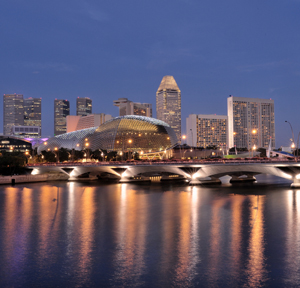WM Market Reports
GUEST OPINION: Reflections On How Far Singapore Has Travelled - Matthews Asia

This guest article gives a personal appraisal of what Lee Kuan Yew achieved as the "father" of modern Singapore.
The following article, republished with permission, is by Patricia Huang of Matthews Asia, the US-headquartered investment firm specialising in the Asia region. The views expressed here are not necessarily those of this publication but it is grateful for the contribution and invites readers to respond.
Years ago, when I was a reporter covering Asia for Forbes Magazine, I had the opportunity to interview Singaporean Prime Minister Lee Hsien Loong. We spent some time talking about his legendary father, Lee Kuan Yew, who died recently at the age of 91.
Under Sir Thomas Raffles, Singapore was a British territory used to control strategic trade routes, and over time, it attracted a growing population of Chinese, Malays and Indians as well as other Asians. It was forged under a regime of “Victorian values”, a belief in strict guidelines around social behaviour. As author and journalist Cherian George has said: “The legacy passed down to today’s Singaporeans isn’t one of random opportunism…There is nothing accidental about it.” Lee Kuan Yew took charge of Singapore and drove it forward.
On issues relating to his father’s penchant for control and perhaps “anti-democratic” style of rule, Lee Hsien Loong would frequently say, Singapore uses “our own style of democracy. It may not work for everybody, but it works for us.” Indeed, much has worked for Singapore. In a span of just a few decades, under Lee Kuan Yew’s paternalistic watch, the Singapore of the late 1960s - with severe overcrowding and lack of infrastructure - was transformed into a “garden city” as manicured as any golf course. Today, it boasts a vibrant, highly educated middle class, exemplary corporate governance and legal infrastructure, and a per capita GDP of $55,000 that is greater than that of the US.
Singapore on the forefront
In the years after World War II, Singapore was relatively
progressive among Asia’s economies. Lee held a staunchly
anti-communist, free-market stance, and was happy to go against
the “consensus” views that were prevalent then by implementing
policies for low taxes, an open free market and a welcoming
environment for the semiconductor industry as well as
multinational corporations - all elements that were way ahead of
their time in Asia. Lee also built a professional, well-paid and
much-admired bureaucracy.
As investors, we often note that it is not the pace of growth that matters so much as the quality. What we mean is that growing quickly is only half the battle - sustaining that growth and creating the institutions that will share that growth as widely as possible (and generate the trust that growth will continue) are key.
The sustainability of Singapore's growth is continuing into a new era. Recently, Lee Hsien Loong posted something rather poetic on his Facebook page, above a photo he took of a crescent moon through some trees. In his post, he recalled a recent reminder to all that “Mr Lee Kuan Yew insisted on making Singapore clean and green before green became fashionable. A literal case of - our forebears planted the trees, and now we are enjoying the shade.”
Singapore has long been on the forefront of Asia's sustainable growth, however we interpret that. And Lee Kuan Yew’s influence has reached far beyond the borders of his small city-state. As an example, the country has been exporting its “green” public-sector expertise and selling the Singapore Inc. model to such countries as China.
This year, Singapore celebrates its 50th birthday [as an independent jurisdiction], and many commentaries marvel at just how far it has come in that time. It is, of course, wrong to ascribe all of Singapore's success to a single man. And Lee Kuan Yew had perhaps become as much a product of Singapore as the country would become of him. But even so, even if his achievement was to carry the early values of Singapore into the modern era - withstanding the challenge of socialism, laying the foundation for future growth and sustainability and championing that success abroad - that is a tremendous feat. Singapore has positioned itself at the forefront of Asia’s economic development and all the region benefits to this day.